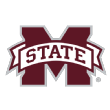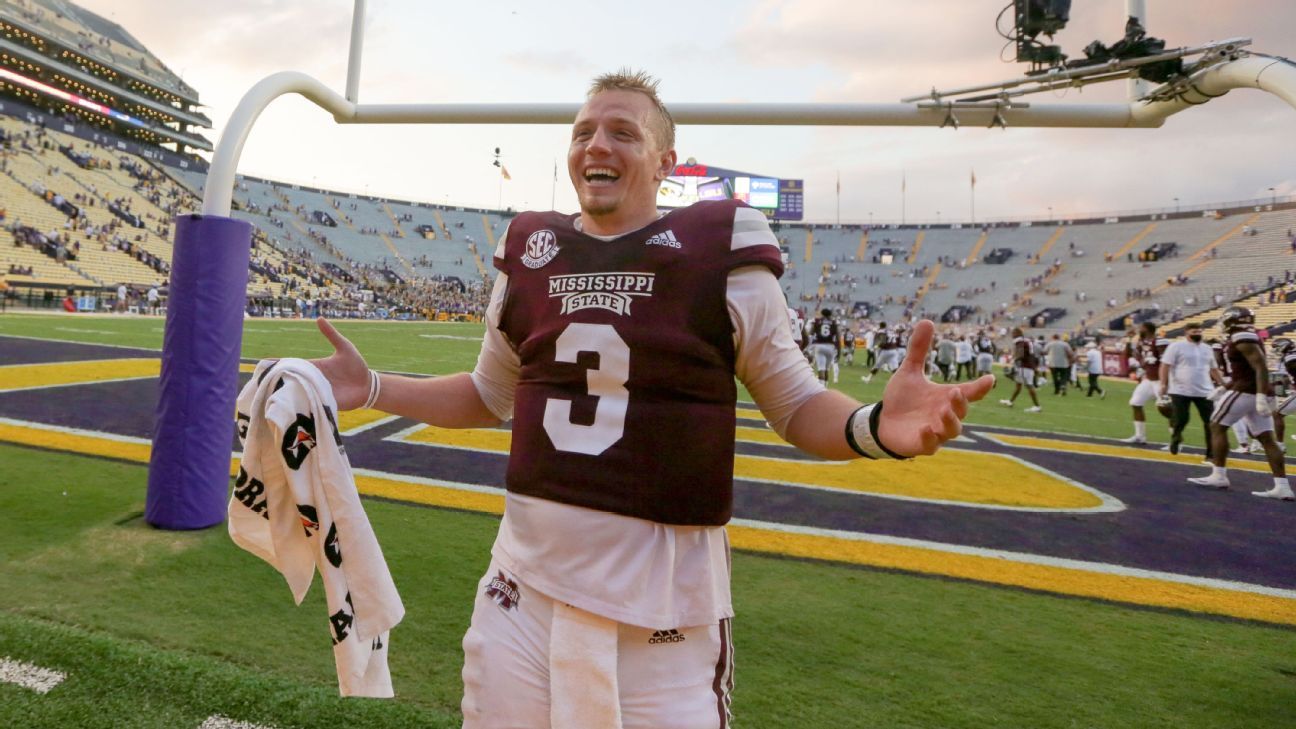A Mike Leach team finished with more than 600 passing yards and single-digit rushing yards. Texas Tech roped a highly ranked team into some serious scoreboard explosions and fell short. Alabama was merciless. Oklahoma lost as a huge favorite to Kansas State.
The word “normal” has lost all meaning in 2020, but damned if Week 4 of the college football season didn’t return a heavy dose of normalcy to our senses. The chaos that only this sport regularly provides shook up the national title race and left us struggling to understand what to think about quite a few prominent teams. Let’s take stock.
The SEC: It Just Means Score
You can’t blame Georgia quarterback D’Wan Mathis for struggling so much in his starting debut: It was out of his hands. With what was happening elsewhere in the SEC, with a few scoreboards lighting up far more than normal, the universe demanded a sacrifice. Mathis’ miserable first-half performance — 6-for-14 for 20 yards, an interception and a sack — provided it before backup and former walk-on Stetson Bennett saved the day for the Dawgs.
Down in Mississippi, things were awfully prolific.


Florida 51, Ole Miss 35
The Gators and Rebels combined for 1,255 yards, 61 first downs and a point total that could have been even higher had the teams not settled for four field goal attempts.
Ole Miss’ Matt Corral went 22-for-31 for 395 yards and three scores and a pick. When Florida safety Shawn Davis got ejected for targeting early in the game, Ole Miss went deep over the middle constantly because Lane Kiffin is a Spurrier-esque scab-picker. But Corral was easily the second-best quarterback on the day: Florida’s Kyle Trask went 30-for-42 for 416 yards and six TDs. He had days of time in the pocket, completed passes to 11 different guys and connected with Kyle Pitts on touchdowns of 1, 16, 71 and 17 yards.
College football is based on matchups, and Pitts didn’t find anyone on the Ole Miss defense he didn’t match up well against. He was either too big or too fast, and in one instance, his stiff arm — punch, really — was too cruel.
0:25
Kyle Trask targets Kyle Pitts, who dashes into the end zone for a 71-yard Florida touchdown.


Mississippi State 44, LSU 34
Maybe the most incredible thing about this game is that the pass rushes were both excellent. MSU sacked LSU’s Myles Brennan seven times in 53 pass attempts, while LSU brought down MSU’s K.J. Costello five times in 65. And yet, after a slow start — 111 combined yards in the first quarter — the Bulldogs and Tigers still managed to finish with 1,057 combined yards.
Costello might have the best raw arm talent — I hate that term, but it’s useful — that a Mike Leach quarterback has ever had, and the Bulldogs figured out fun ways to get star running back Kylin Hill involved despite the whole “Leach doesn’t really run the ball” thing: He rushed seven times for 34 yards — and caught eight passes for 158 yards and a touchdown.
After LSU’s magnificent, offense-driven run to the 2019 national title, SEC schools loaded up on points-friendly coaches. Ole Miss hired Kiffin, Mississippi State hired Leach, Missouri hired Eliah Drinkwitz, and while Arkansas went with lifetime line coach Sam Pittman, he in turn hired Kendal Briles as his offensive coordinator. That’s a whole lot of offensive IQ residing in what we assume to be the bottom half of the conference. That, in turn, could result in quite a few Big 12-style shootouts and more potential upsets.
Elsewhere, Alabama’s Mac Jones went 18-for-24 for 249 yards and two scores against what could be a solid Mizzou pass defense, and Auburn’s Bo Nix threw for 233 yards and three scores in 27 attempts against what could turn out to be an even better-than-solid Kentucky secondary. In all, five SEC QBs topped a 165 passer rating (Corral, Trask, Jones, Nix, Costello), and another three topped 140 (Bennett, Missouri’s Shawn Robinson and Tennessee’s Jarrett Guarantano). Passing is winning in the SEC, apparently, and even with the recent success of players like Joe Burrow and Tua Tagovailoa, it’s still jarring to see this taking place in a conference that was for nearly a century known primarily for defense and field position.
(Remind me how fun this all was when Saturday’s huge Auburn-Georgia game, pitting the No. 1 and No. 2 defenses in the country per SP+, turns into a rock fight.)
The Burrow Index
The temptation is impossible to avoid. Last fall, we witnessed maybe the greatest season-long quarterback performance in the history of the sport — Burrow setting a passer rating record while throwing for 5,671 yards and 60 TDs and leading LSU to a 15-0 record. And with the way that QB stats have continued to one-up each other from year to year of late, it’s hard not to start thinking about who will go wild next.
Burrow’s raw numbers will be impossible to top in a shortened season, but which Burrow-like characters — transfers and/or second-year-or-thereabouts starters who were good but not amazing last year — are doing the most Burrow-like things early in the season? Let’s take a look. Presenting the Burrow Index, a combination of raw and rate stats, personality, wins and whatever bonus points I feel like offering. (Important note: This is not particularly scientific. If you’re going to yell at me on Twitter about this, at least take that into account.)

1. K.J. Costello, Mississippi State
Key stats: 83.1 QBR (10th), 168.1 passer rating (14th), 623 passing yards per game (first), 1-0 record
He threw a pretty bad pick-six in the first half and took a lot of sacks, but look: If you’re going to average 623 yards per game in the SEC, you’re going to rank really high on that list. Costello, receivers Osirus Mitchell, JaVonta Payton and Tyrell Shavers (combined: 17 catches, 373 yards, three TDs) and Hill are going to be absurdly prolific in Leach’s system. Obvious bonus points for taking down Burrow’s former team on its home field in his first game in maroon. 91% Burrow.

2. Kyle Trask, Florida
Key stats: 93.4 QBR (third), 201.8 passer rating (seventh), 416 passing yards per game (second), 1-0 record
He tied an SEC record with six touchdown passes in a single game on Saturday. With whom does he share that record? Burrow, of course. Most SEC defenses will offer more resistance than Ole Miss, but the Burrow Index was meant for players who tie or break Burrow records, yeah? 89% Burrow.

3. Mac Jones, Alabama
Key stats: 95.2 QBR (first), 189.7 passer rating (ninth), 249 passing yards per game (22nd), 1-0 record
He was pulled from the game earlier than the two guys above him because Bama was not struggling much with Mizzou, but whatever he lacks in raw volume, he makes up for with the bonus points earned when his girlfriend quit her job to make sure his chances at going Full Burrow were maximized. 88% Burrow.

4. D’Eriq King, Miami
Key stats: 83.8 QBR (ninth), 153 passer rating (22nd), 245 passing yards per game (23rd), 52 rushing yards per game (bonus), 3-0 record
You want to score high in the Burrow Index? Bring Miami back to prominence. The former Houston star has done everything asked of him so far, and The U has rolled to a 3-0 record and 43 points per game. He gets bonus points for his third-down perfection, too: He’s 18-for-25 for 248 yards and four TDs on third down, 9-for-12 for 137 on third-and-10+. 83% Burrow.

5. Bo Nix, Auburn
Key stats: 86.6 QBR (eighth), 168.4 passer rating (13th), 233 passing yards per game (31st), 1-0 record
Nix still throws off his back foot too much for my liking and his piloting of Auburn’s win over Kentucky was more “solid and sturdy” than “holy crap, look at this guy!” But he was very good against a potentially strong Kentucky defense, and he scored bonus points for this off-the-back-foot rocket to Seth Williams.
0:31
Bo Nix throws a dart to wide receiver Seth Williams, who goes up and snags it, extending Auburn’s lead.
More bonus points: He pinned Kentucky inside the 10 with punts twice, too. 82% Burrow.

6. Zach Wilson, BYU
Key stats: 87.4 QBR (seventh), 216.6 passer rating (third), 312 passing yards per game (ninth), 2-0 record
No, Wilson hasn’t exactly faced power conference-level competition so far, but Navy and Troy aren’t terrible, and Wilson’s Cougars have been cruel and dominant. And he proved he was meant for a list like this two seasons ago, when he went 18-for-18 passing in a bowl game. 77% Burrow.

7. Dillon Gabriel, UCF
Key stats: 77.4 QBR (14th), 173.5 passer rating (12th), 413 passing yards per game (third), 2-0 record
Again, opponent adjustments apply here — UCF has thus far beaten Georgia Tech (63rd in SP+) and ECU (105th). But Gabriel threw for 3,653 yards and 29 touchdowns as an unexpected freshman starter, and he’s completing 67% of his passes at 14 yards per completion so far. Full Burrow? No. Tremendous? Absolutely. 76% Burrow.

8. Matt Corral, Ole Miss
Key stats: 91.8 QBR (sixth), 203.5 passer rating (sixth), 395 passing yards per game (fourth), 0-1 record
Really, Corral did only one thing wrong against Florida on Saturday: He couldn’t defend Trask. Going unbeaten is a huge part of the Full Burrow, and losing is a point deduction. Make no mistake, though: Ole Miss’ offense looks diverse and terrifying, and Corral dealt with a solid amount of pass-rush pressure and still delivered. 74% Burrow.

9. Shane Buechele, SMU
Key stats: 75.3 QBR (15th), 164.5 passer rating (17th), 284 passing yards per game (14th), 3-0 record
The veteran gunslinger has taken full advantage of a weak slate of opposing defenses; he completed 72% of his passes for 711 yards in road wins over Texas State and North Texas before taking it easy against SFA on Saturday. The schedule gets harder from here — Memphis is scheduled to visit on Saturday — but one can assume the numbers will remain gaudy. 69% Burrow.

10. Malik Willis, Liberty
Key stats: 74.1 QBR (17th), 154.3 passer rating (21st), 209 passing yards per game (38th), 126 rushing yards per game (bonus), 2-0 record
Remember him? The Auburn transfer has started brilliantly for Hugh Freeze and the Flames. He rushed for 168 yards in a win over WKU, then threw for 285 and two scores in a tight win over FIU. (He also injured his arm in the fourth quarter. We’ll see what comes of that.) 64% Burrow.
Also under heavy consideration: Boston College’s Phil Jurkovec, North Carolina’s Sam Howell, Louisiana Tech’s Luke Anthony, and maybe Kentucky’s Joey Gatewood if the NCAA would decide whether he gets a transfer waiver.
Special teams: Still an adventure?
Special teams nearly destroyed Texas’ unbeaten record in Lubbock on Saturday, then special teams helped to save the Longhorns.
Nearly every possible special-teams event happened at some point.
Bad: Texas punter Ryan Bujcevski shanked a 17-yarder in the second quarter and after the ensuing Tech touchdown drive, the Red Raiders recovered a surprise onside kick. In the third quarter, Bujcevski had a punt blocked, which set up Tech in the Texas red zone, and D’Shawn Jamison muffed a punt, which Tech’s Xavier Martin returned for a touchdown.
Good: Texas’ Cameron Dicker made two field goals, including a 43-yarder (Tech’s Trey Wolff missed a 46-yarder, too), and Tyler Owens blocked a punt that Jahdae Barron collected for a touchdown. And with 2:39 left, down eight, Texas recovered an onside kick, then drove for the tying touchdown and 2-point conversion.
Wild special-teams events have been one of the themes of the early season, and it remained the case in Week 4, not only in Lubbock but also in places like Lafayette, where Louisiana’s scattershot Nate Snyder, who has missed four FGs this year, bombed in a 53-yard, game winner at the buzzer. But how have the season averages evolved? Were these games truly special, or are things settling down a bit overall? Let’s compare the overall season averages to September’s games last year:
-
Field goals under 40 yards: College kickers hit 82.6% of these last September and 81.0% this September
-
Field goals over 40 yards: 59.9% last September, 62.7% this September
-
PAT attempts: 96.9% last September, 96.7% this September
These seem to be evening out after a rusty start. And it appears if you’ve got a good kicker capable of nailing some long-bomb kicks, he’s even more capable of that this season.
-
Net yards per punt: 38.4 last September, 37.9 this September
-
Blocked punts: 1.0% of all punts last September, 1.5% this September
-
Punt returns: 55.9% gaining at least 5 yards last September, 50.8% this September
Punting has been a smidge more adventurous, but we are seeing fewer solid returns this time around as well.
-
Average starting field position from kickoffs: 26.1 last September, 26.0 this September
-
Kick returns: 13.1% gaining 30+ yards last September, 12.8% this September
-
Onside kicks: 16-for-44 (36%) last September, 5-for-15 (33%) this September
I’ll admit, I was surprised that the onside kick rate was that close. Anecdotally, it seemed there have been quite a few fun recoveries this year. (Of course, college football doesn’t get to take credit for the most befuddling and hilarious onside kick of the season thus far — the one that happened in Dallas last Sunday.)
On average, special-teams units have caught up to where they were in previous years. This fan of chaos thinks that’s rather unfortunate.
The role of the nonconference slate
Oklahoma walloped Missouri State while Kansas State got upset by Arkansas State. Two weeks later, KSU beat OU. Texas obliterated UTEP, while Texas Tech thought really hard about losing to Houston Baptist. Two weeks later, Tech led UT by 15 with 2:30 left. Boston College thumped Duke, then nearly lost to Texas State. Georgia Southern nearly lost to Campbell, then nearly beat Louisiana.
Again, college football isn’t exactly known for its stability. The old Lou Holtz line about how “you coach a different team every week” continues to ring true. But Week 4 seemed particularly jarring in this regard and as we get used to a temporary world in which power conference teams play one nonconference game at most (and none against fellow P5s), we might be seeing a side effect here. Teams are generally at their flakiest in September, when they perhaps don’t quite know who they are or what they’ve got yet. But instead of dropping a game in nonconference play — or winning a lackluster contest against a cupcake — these bouts of craziness have higher stakes.
Granted, Week 4’s fallout could have ended up far more significant than it did. For a while on Saturday afternoon, after OU’s loss, it looked as if LSU, Texas and Georgia might all fall. In the end, only one of three did. But when you look ahead to the second set of SEC games next week — Auburn at Georgia, Texas A&M at Alabama, Florida hosting South Carolina and former Florida head coach Will Muschamp — and think about what might come with a few more sudden personality shifts … well … that sounds pretty fun to me. Anybody have a fast-forward button so we can go ahead and skip to Saturday?
